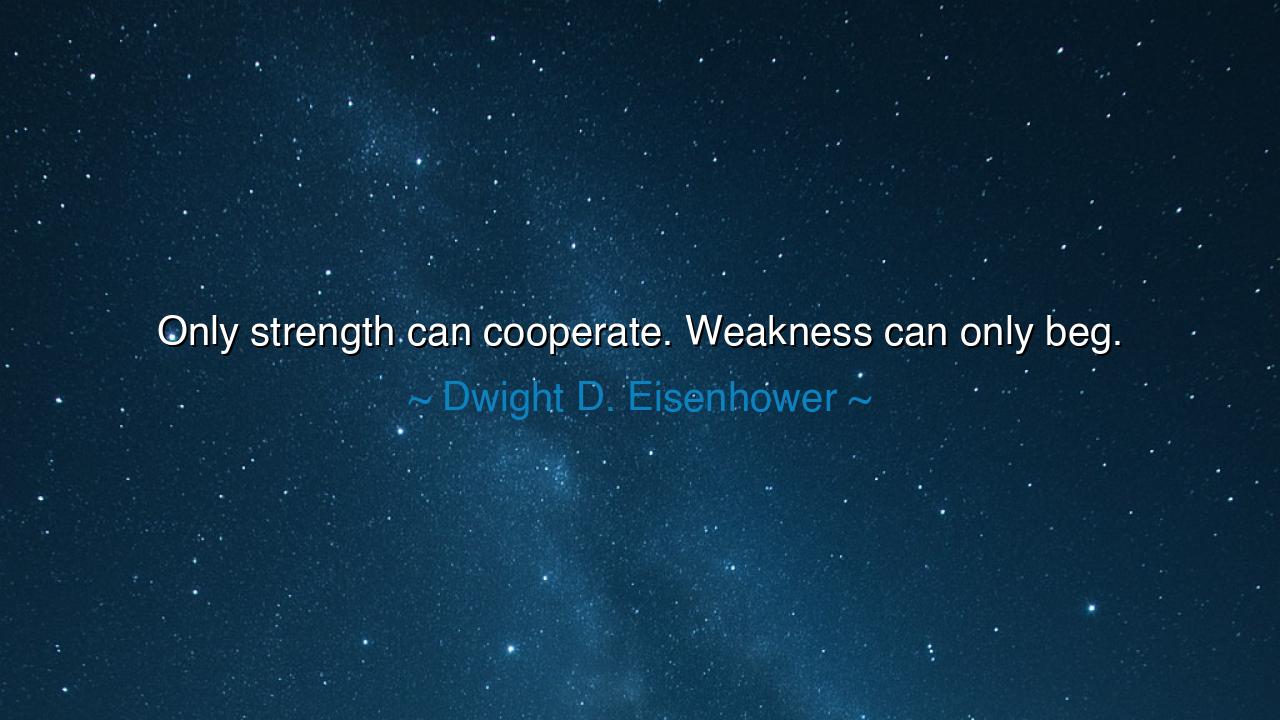
Only strength can cooperate. Weakness can only beg.






Dwight D. Eisenhower, the soldier who became a statesman, once declared with solemn clarity: “Only strength can cooperate. Weakness can only beg.” In this utterance, he unveils a truth forged in the crucible of war and tested in the furnace of diplomacy: that true cooperation is born not from desperation, but from strength—the strength of will, of resources, of confidence. For one who is weak has no power to negotiate as an equal; he can only plead for mercy. But one who is strong may sit at the table of nations, not as a beggar, but as a partner, able to give as well as to receive.
The meaning of these words reaches beyond politics into the very fabric of human life. To cooperate requires not only the desire to work with others, but the ability to bring something to the common cause. Strength—be it moral, intellectual, or material—creates the capacity to share, to compromise without fear, to support others without losing oneself. Weakness, however, binds the hands and silences the voice. It leaves the soul at the mercy of others, forced not into partnership but into dependency. Thus, Eisenhower reminds us that cooperation is the privilege of the strong.
The origin of this wisdom can be traced to Eisenhower’s life as Supreme Commander of the Allied forces during World War II. He witnessed firsthand that alliances are not made by pleading, but by strength. The cooperation of nations like the United States, Britain, and the Soviet Union was possible only because each brought strength—men, arms, strategy—to the fight. Had any come empty-handed, they would not have been partners but supplicants. After the war, as President, Eisenhower saw the same truth in peace: strong nations can work together to build order; weak nations are forced to accept what others decide.
History offers clear illustrations of this principle. Consider the Marshall Plan after World War II. The United States, strong in industry and wealth, extended aid to rebuild Europe. This was not charity born of weakness, but cooperation born of strength: America’s resources restored allies and secured lasting bonds. Contrast this with nations crushed by poverty or war, who could only beg for help without the ability to shape the terms. Strength gave the power to cooperate; weakness left only the plea for survival.
The imagery of Eisenhower’s words is stark and evocative: the strong standing side by side, clasping hands as equals; the weak kneeling, stretching hands upward in supplication. Cooperation requires uprightness, the ability to look another in the eye with dignity. Begging requires bending low, surrendering both will and voice. Thus, the call of his words is not to domination, but to the cultivation of the kind of strength that makes true partnership possible.
The lesson for us is clear: if you wish to cooperate with others, first cultivate strength within yourself. In personal life, this means building character, discipline, and resilience so that you may give as well as receive in relationships. In communities, it means creating systems of justice and stability that allow all to contribute, rather than leaving some too weak to do anything but beg. Strength is not for selfish domination, but for mutual empowerment.
Practically, this means striving to develop your talents and resources—not merely for personal gain, but so you may share them with others. Cultivate the strength of mind through study, the strength of body through discipline, and the strength of spirit through integrity. When you enter into cooperation—whether in family, work, or society—bring something of value. For in doing so, you elevate both yourself and those around you, and you ensure that your voice is heard as that of a partner, not a supplicant.
So let Eisenhower’s words stand as timeless counsel: “Only strength can cooperate. Weakness can only beg.” Do not be content to live as one who pleads at the doors of others, but rise as one who has something to offer, who can join hands in dignity, and who can build together a greater future. For in strength lies the power to create, to unite, and to endure. And in such strength, cooperation becomes not dependence, but destiny.






AAdministratorAdministrator
Welcome, honored guests. Please leave a comment, we will respond soon